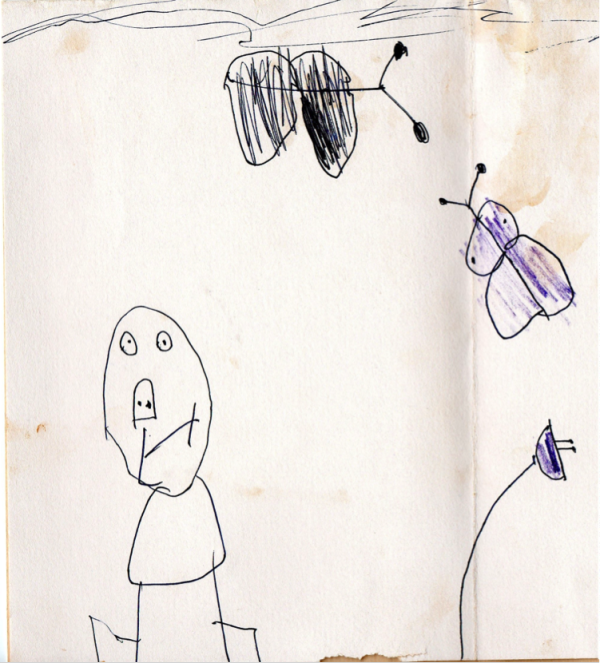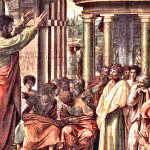How TO Talk About God
by Stephen Bullivant
Filed under God's Nature
This is part two of a two-part series, adapted from Stephen Bullivant's new book, The Trinity: How Not to Be a Heretic (Paulist Press, 2015). Read part one here.
"A time to speak"
I ended my last post in this short series with the apparent affirmation that silence is the only appropriate mode for Christian thought and prayer. This is what is known as apophatic theology, the “negative way”, or – as I like to call it – the via Alison Krauss-a.
Far be it from me to denigrate this manner of adoration: it has a long and distinguished history within the Christian tradition. The angel Gabriel, for example, prescribed Zechariah some silent time in preparation for his important task of raising John the Baptist (Luke 1:20). Moreover, popular piety has long imagined the “holy night” of the first Christmas to have been a “silent night.” Throughout Christian history, there have been holy men and women who, singly or together, have devoted themselves to long periods—sometimes even whole lifetimes—of silence. Shorter spells of silent prayer or meditation are practiced by many Christians, of many different stripes, throughout the world on a daily or weekly basis.
Silence certainly has its place, and being “lost for words” is undoubtedly a fitting expression of wonder and gratitude before the One who is “majestic in holiness, awesome in splendor” (Exodus 15:11). We human beings are pretty special ourselves, and our intelligence and language are among our greatest glories. Yet it’s still worth remembering sometimes that we ain’t all that. “So do not become proud, but stand in awe” (Romans 11:20).
On its own, though, silence is, in more ways than one, nothing much to shout about. Christianity just doesn’t work as a completely wordless religion. Some Christians can keep silent all of the time; all Christians should keep silent some of the time; but all Christians can’t (and mustn’t) keep silent all of the time. There may indeed be “a time to keep silence,” but there is also “a time to speak” (Ecclesiastes 3:7). Here we return to a point made earlier. Scripture itself is full to bursting with human words and ideas—our very own, flawed, not-good-enough-for-God words and ideas—about God. More to the point, it insists, time and again, that we should be so too:
"Praise the Lord! Praise God in his sanctuary; praise him in his mighty firmament!
Praise him for his mighty deeds; praise him according to his surpassing greatness!...
Let everything that breathes praise the Lord! Praise the Lord!" (Psalm 150:1-2, 6)
That is, I think you’ll agree, not exactly “shaddap you face.”
This is the great paradox of theology, indeed of Christian living as a whole. It is no wonder that those who have—or hope they have—received the Holy Spirit, whether as a gentle breath (John 20:22) or “like the rush of a violent wind” (Acts 2:2), feel moved both to “treasure and ponder [these things] in their hearts” (cf. Luke 2:19) and to “glorify and praise God for all they have heard and seen” (cf. Luke 2:20). They have also been positively commanded to “Go into all the world and proclaim the good news to the whole creation” (Mark 16:15). Naturally, it is nearly impossible to do any of these things without words, or ideas, or concepts. And yet...the only words, or ideas, or concepts we have to do them with cannot possibly come close to doing God justice. Tasty though McDonald’s food is, we can’t build a Heston Blumenthal meal out of McNuggets and McShakes. And “very good” though Creation is (Genesis 1:31), we can’t construct an accurate picture of our God out of creaturely categories: “For my thoughts are not your thoughts, nor are your ways my ways” (Isaiah 55:8).
Another Parable
Speaking of pictures though, perhaps it is time for another parable—one that might rescue us from the corner into which we (with a lot of help from the scriptures) have painted ourselves.
What, do you suppose, is this?
I have shown this picture to a good number of different audiences over the past several years. Bemused amusement is the normal first impression. After some reflection, most people agree that the antenna-looking object on the right is some form of flower, perhaps a daffodil or something similar. There is little controversy over the two, worryingly large airborne objects: they are presumably butterflies—although, if your love is like one of those butterflies, it might be time to seek a relationship counsellor. But what of the strange figure on the left? I have heard many creative guesses—it is an alien, or a snowman, or perhaps a Peppa Pig—but no one is ever really sure. “They may indeed look, but not perceive” (Mark 4:12).
“But blessed are your eyes, for they see” (Matthew 13:16): it is a drawing of the delightful Norma Bullivant, my mother, by her youngest son, me. Neither of us can remember when it was drawn, though both of us hope it was a very long time ago.
Now, you have probably never met or seen a photograph of my mother. You’ll have to trust me when I say that this is not a perfect likeness of her. In fact, it is a truly terrible one. For example, she has arms, and hair, and eyebrows, and knees. Even in her thirties, when this was probably drawn, her legs were not quite that thin. On any estimation, it is an extremely inaccurate picture of her. If you happen to see my mother walking down the street, I doubt that you’ll now go up to her and ask, “Don’t I know you from somewhere?”
Considered objectively, this picture is an insult to my mother. Imagine she and I were in a modern art gallery, and hanging there was this picture, but painted by some trendy young artist. Suppose I said, “Mom, why is there a photo of you in the gallery?” Or what if I did this picture for her now, in my thirties: “Look mom, I’ve made you this for Mother’s Day. I’m really pleased with it. Don’t you think it looks exactly like you? See how well I’ve captured your nose!?” Perfectly understandably, I think she would find those kinds of comments very hurtful indeed. If that really is the best picture I can draw of her, flowers or chocolates would be a better Mother’s Day gift. For that matter, so would nothing at all.
"You have searched me and you know me"
Why then has she kept this false, insulting image? Why didn’t she screw it up in hurt and anger, and bin it, all those years ago? Why instead has she lovingly kept it?
Most parents, I expect, have a cherished collection of similarly bad artistic efforts by their children. They have kept them because they were delighted to receive them. Infants are not brilliant artists by adult standards, but they put time, thought, effort, and care, into doing the very best job they can. Parents know this. They also know that the resulting pictures are far more than bad representations of what mom or dad look like; they are excellent representations of what their little children’s love and affection for mom or dad look like.
Look again at the image. One day, when I was very small, I decided to draw a picture. Of all the many exciting subjects I could have chosen, I picked my mother. I placed her in a garden, in spring or summer when the flowers are in bloom, and surrounded her with butterflies. I even put what I’m pretty sure is meant to be a big smile on her face. Someone who knew me well at that age—someone “acquainted with all my ways” (Psalm 139:3)—would understand instantly what I was trying to convey with my flawed, faltering, and false pen strokes—which is why she still has it after all those years.
"Queerer than we can suppose"
As we should have learned by now, even the best metaphor or analogy isn’t perfect. They don’t bear too much prodding or stretching, whether you are comparing love to a butterfly, “the LORD the God of hosts” (Hosea 12:5) to fine dining, or religious language to childish scribblings. Nevertheless, they do tell us something.
Our flawed and fragile thoughts and words are not up to the job of giving a full, wholly sufficient description of the Most High. It is God who is the Truth, the whole Truth, and nothing but the Truth (cf. John 14:6, 17), and not our witness statements about him. (Incidentally, this is not a failure specific to religious thinking and speaking. The great British biologist, J. B. S. Haldane, once famously said: “Now my own suspicion is that the Universe is not only queerer than we suppose, but queerer than we can suppose”1. If that is true of creation, how much more must it be true of the Creator?)
The life of our saintly medieval theologian, Thomas Aquinas, illustrates this point rather well. Thomas wrote book after book of biblical commentary and theology, millions upon millions of words about God. Then towards the end of his life, he had a direct, mystical experience of God himself. After that he laid down his pen, mid-book, and never wrote another word. When asked why, he answered simply: “I can’t.... Everything I have written seems like straw by comparison with what I have seen and what has been revealed to me.”
Those of us who strive to think about, speak of, and pray to God will do well to remember this lesson in humility. “For great is the might of the Lord; but by the humble he is glorified” (Sirach 3:20). In thinking theologically, we are getting better acquainted with who God is—who God has revealed himself to be. But Christians needn’t kid themselves that by the end of this or that book or Bible study program, or even by the end of our lives studying scripture and theology, we’ll know God as well as he knows us. That’s what heaven is for: “For now we see in a mirror, dimly, but then we will see face to face” (1 Corinthians 13:12). For the time being, our sight is hampered by both our own short-sightedness, and the gloriousness of what it is we’re trying to glimpse. As another saintly medieval theologian, Anselm of Canterbury, once prayed:
"The truth is, I am darkened by myself
And also dazzled by you.
I am clouded by my own smallness
And overwhelmed by your intensity;
I am restricted by my own narrowness
and mastered by your wideness."
However, we mustn’t let that stop us trying – and most of our tryings will be done through the medium of words. God is indeed “more than words,” as St Thomas (like Extreme) well realized. But note, too, that God let Thomas write over seven million words about him before giving him writer’s block. After all, “The Word became flesh and lived among us” (John 1:14). God became man, and thought and spoke in human language. And we have it on the Holy Spirit’s authority that the languages of “every nation under heaven” can be used to talk meaningfully “about God’s deeds of power” (Acts 2:5-11).

Related Posts
Notes:
- Possible Worlds and Other Essays (London: Chatto and Windus, 1927), p. 286 ↩
Note: Our goal is to cultivate serious and respectful dialogue. While it's OK to disagree—even encouraged!—any snarky, offensive, or off-topic comments will be deleted. Before commenting please read the Commenting Rules and Tips. If you're having trouble commenting, read the Commenting Instructions.














